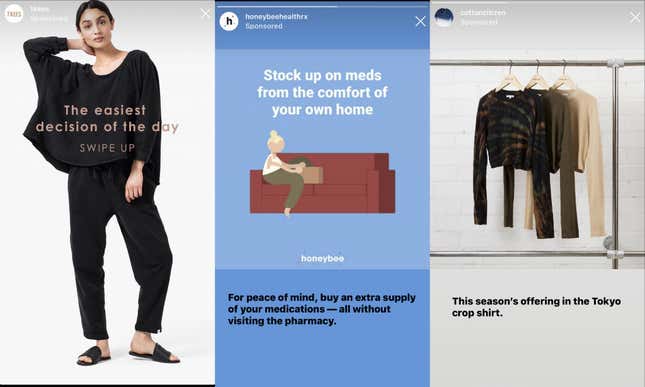

After a weekend spent indoors with my face glued to my phone, scrolling through Instagram’s collective catalog of boredom and anxiety, I fell prey to its algorithm. I clicked on at least seven ads for sweatpants, leisurewear, telemedicine services, and online fitness workouts, spooked every time by the accuracy of what the machine was trying to sell: products, of course, but also spiritual comfort.
TKEES, a brand that usually sells expensive leather sandals with whisper-thin straps, advertised “elegant comfies perfect for staying in”—shapeless sweatshirts and matching sweatpants that are chic enough for sitting on the sofa and would look nice with a pair of shoes, if I ever put them on my feet again. Entireworld, another direct-to-consumer clothing company, pushed sweatsuits I’d previously seen on Eva Chen into my feed enough times to compel me to click through. Old Navy advertised a 50 percent off sale on their entire site—a satisfying landing page that also led me to the Gap. My cart brimmed with workout tights, sweatshirts, French terry loungewear, none of which I need. Elsewhere, tie-dyed workout leggings enticed me. Various teletherapy options flashed before my eyes and DTC psychopharmacological drug options promised that I could get my meds without leaving the house. A company advertising an at-home gel manicure removal kit nearly got me good. Being vain about my nails is one of many stupid things I care about, but when my body soon returns to its feral state, I will have already ripped my gel manicure off in a fit of pique. I look forward to this day, as it will be a brief moment of excitement that will punctuate the smooth, unbending stretch of time that looms ahead.
-

-

-

-

-

-

-

-

-

-

-

-

-

-

-

-

-

-

-

-

-

-

-

-

-

-

-

-

-

-

-

-

-

-

-

-

-

-

-

-








































